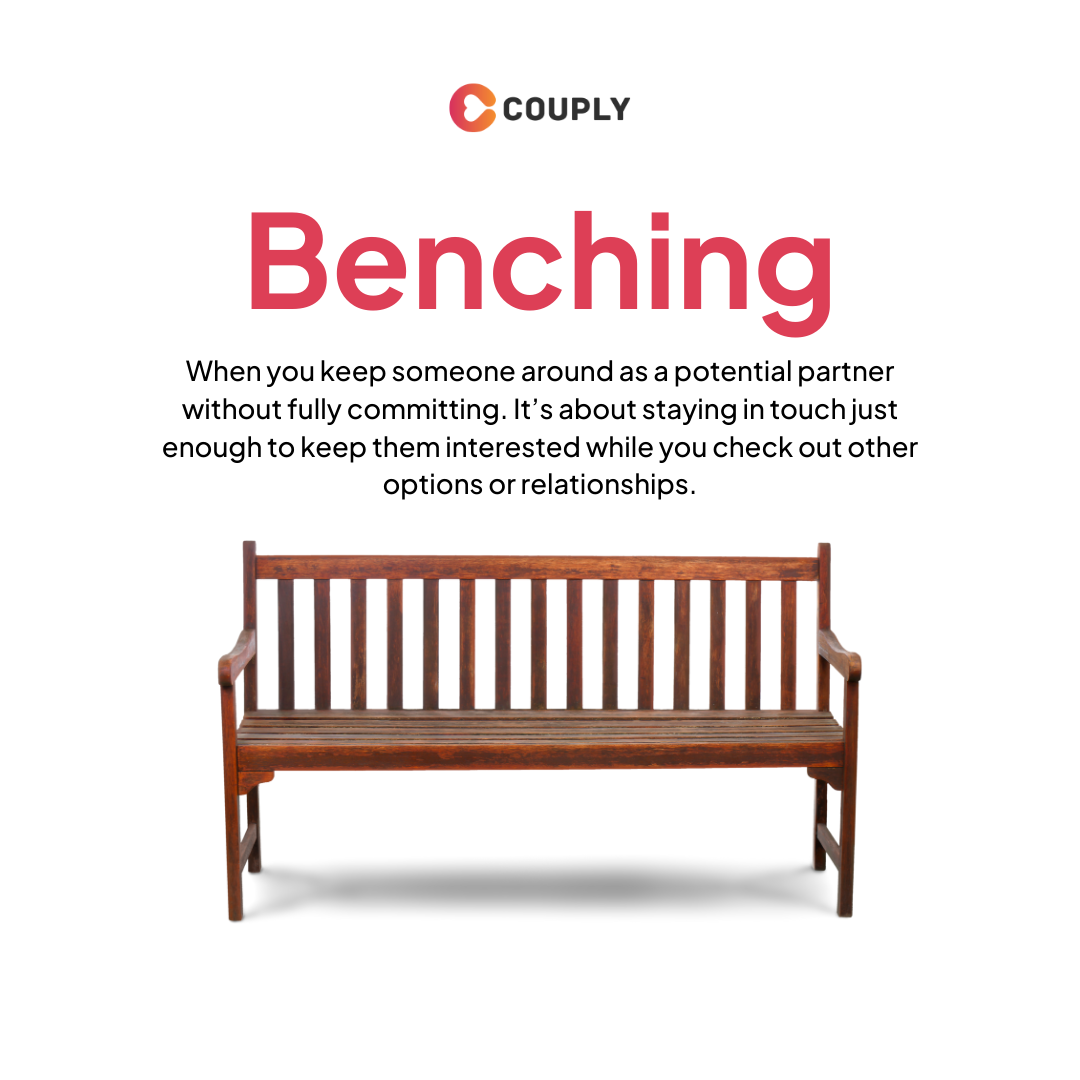You’re texting someone new. They’re flirty, quick with compliments, and maybe even hint at future plans. You feel the spark… until days go by with nothing but radio silence. Then, just when you’ve decided they’ve disappeared, they resurface with a casual “Hey, how’s your week?”
You’re not ghosted. You’re not quite dating either. You’re stuck in limbo. Welcome to benching—the dating trend that’s less about love and more about keeping you “warm” on the sidelines while someone else decides if you’re worth putting in the game.
Benching is frustrating because it dangles hope without offering commitment. It feels like you’re close to being chosen, yet somehow you’re never the first pick. And if you’ve been benched before, you know the cycle: confusion, false excitement, letdown, repeat.
This guide unpacks everything—what benching is, why people do it, how to spot it early, and how to stop wasting time on someone who keeps you waiting.
What Is Benching in Dating?

Think of sports. The coach doesn’t put every player on the field. Some sit on the bench, suited up but waiting for their chance. That’s exactly what happens in dating when someone benches you.
Instead of committing, they keep you as an option. They don’t disappear completely (like ghosting), but they don’t move things forward either. You’re not the priority—you’re a backup plan.
Benching usually looks like:
- Random, inconsistent communication.
- Excuses about being “too busy” to hang out.
- Just enough attention to keep you interested.
- No progress toward commitment, no matter how much time passes.
Here’s the key difference: casual dating is transparent, benching isn’t. With casual dating, both people know it’s not exclusive and expectations stay low. With benching, one person knows they’re keeping the other in reserve. The other person? Left in the dark.
Why Do People Bench Others?
Not everyone who benches is a villain twirling their mustache. But the behavior usually comes from selfish motives. Here’s why people do it:
1. Fear of Commitment
Some people love the thrill of dating but panic at the idea of committing. They’ll keep you around because they like the attention, but they’re too afraid to actually step up.
2. Desire for Options
In today’s swipe culture, people want to keep their “roster” open. Benching lets them keep you available without giving up the possibility of someone “better” coming along.
3. Ego Boost
It feels good to know someone’s waiting. Benching feeds the ego. It’s not about building something real—it’s about validation.
4. Uncertainty
Sometimes, the person doesn’t know what they want. Instead of being honest and letting you go, they keep you hanging while they “figure it out.” Translation: they’re stringing you along until they make up their mind.
5. Avoiding Guilt
Breaking things off requires honesty, and honesty risks hurting someone’s feelings. Instead of doing the decent thing, they bench you to avoid confrontation—at your expense.
Signs You’re Being Benched
Benching is slippery. It doesn’t look like a breakup, but it doesn’t feel like real dating either. The problem is that it feeds you just enough attention to keep you hanging around. If you’re wondering whether you’re on someone’s bench, here are the clearest red flags.
1. Their Communication Is Hot and Cold
One week, they’re blowing up your phone with flirty texts, late-night memes, and maybe even talk about hanging out. The next week? Radio silence. You’re stuck wondering if you did something wrong, when really, you’ve just been pushed back to the sidelines until they feel like pulling you in again.
2. Plans Never Actually Happen
They’ll suggest grabbing drinks “sometime” or mention going to that new brunch spot “soon,” but when it comes to setting a date, they ghost the conversation. Vague promises are their specialty. Real effort to follow through? Not so much.
3. You Feel Like Their Backup
They don’t reach out to check in on your day or share anything meaningful. Instead, you hear from them when they’re bored, lonely, or when other plans fell through. If their attention feels more like a convenience than a choice, you’re not a priority—you’re insurance.
4. They Give You Just Enough to Stay Hooked
A random “I miss you,” a heart reaction on your Instagram story, or a short flirty text out of nowhere—it’s never enough to build a relationship, but it’s always enough to keep you hoping. They’re masters at breadcrumb attention: too little to matter, but just enough to keep you interested.
5. Excuses Pile Up
“Work’s crazy right now.” “I’m just tired.” “Family stuff came up.” Sometimes these are legit, but when every attempt to meet up gets brushed aside with a new excuse, it’s not bad timing—it’s avoidance.
6. The Relationship Doesn’t Move Forward
You’ve been talking for weeks, maybe months, yet nothing has changed. No clarity, no consistency, no sign they actually want to deepen the connection. If it feels like you’re running in place, that’s not momentum—it’s benching.
7. They Dodge Every Conversation About “What This Is”
Bring up where things are going and suddenly they’re “not ready for labels” or “just seeing where things go.” The truth is, they already know where they want this to go—nowhere. They just won’t admit it because keeping you guessing benefits them.
Here’s the truth: If reading this list makes you feel like you’re stuck in a weird in-between, you probably are. People who want to be with you will show up consistently. They’ll follow through on plans. They’ll make their intentions clear. If someone keeps you waiting, doubting, and overthinking, chances are you’re not in their future—you’re just on their bench.
The Emotional Impact of Benching
Benching isn’t just annoying. It chips away at you little by little, leaving bruises you might not notice until much later. Unlike ghosting, which is a quick rip of the bandage, benching stretches out the uncertainty, keeping you in a half-relationship that feels more like an emotional trap.
Here’s how it plays out.
1. Constant Anxiety and Overthinking
You’re glued to your phone, waiting for the next message. Did you say something wrong? Why did they like your story but not reply to your text? That low-level hum of anxiety becomes your baseline. Instead of enjoying the connection, you’re caught in a cycle of analyzing every emoji, every pause, every delayed reply.
2. Feeling Invisible and Replaceable
Being on someone’s bench makes you feel like you’re not good enough to be in the game. You’re there, but not chosen. You start to believe you’re a backup in love overall, not just in this one situationship. That stings in ways ghosting never could, because you’re constantly reminded you’re “almost” but not quite.
3. A Slow Drain on Self-Esteem
Every time you accept crumbs of attention, you reinforce the idea that this is all you deserve. Over time, your self-worth takes the hit. You stop expecting consistency. You settle for less. And the more you tolerate it, the harder it feels to ask for more.
4. Wasted Time and Emotional Energy
Benching traps you in limbo. While you’re waiting for them to make a move, you’re missing out on people who’d actually show up for you. Weeks, months—even years can slip by without progress, and when you look back, you realize you gave too much of yourself to someone who never planned to give anything real in return.
5. Trust Issues That Linger
After being benched, it’s tough to believe anyone means what they say. Even if someone new is consistent, you catch yourself waiting for the shoe to drop. You expect the hot-and-cold cycle to repeat. That suspicion bleeds into new relationships, making it harder to relax and feel safe.
6. The Emotional Rollercoaster Effect
Benching feeds you highs and lows that mimic addiction. A random text at midnight feels euphoric, and then the silence that follows sends you crashing. Those ups and downs can feel like passion, but they’re really just instability. And the longer you ride that rollercoaster, the more normal it starts to feel.
The bottom line: Benching isn’t casual dating. It’s emotional manipulation dressed up as “keeping things chill.” It leaves you drained, doubting yourself, and disconnected from the kind of love you actually deserve.
Why Benching Can Hurt More Than Ghosting
Ghosting is brutal, but at least it’s final. One minute they’re there, the next they’re gone. It stings, but you get closure.
Benching is different. It drags on. You’re not rejected outright—you’re strung along with crumbs of attention. That keeps you hopeful, confused, and stuck.
The real cruelty of benching is in the ambiguity. Ghosting says “no.” Benching says “maybe”—forever. And “maybe” hurts a lot more when what you really need is clarity.
How to Respond if You’re Being Benched
Getting benched feels awful, but here’s the good news: once you see it for what it is, you get your power back. You’re no longer at the mercy of someone else’s half-effort. Here’s how to take control when you realize you’re on the sidelines.
1. Call It Out in Your Head
The first step is naming it. Stop excusing their inconsistency as “bad timing” or “they’re just busy.” If they wanted to make time, they would. Recognizing you’re being benched pulls you out of the fog and helps you stop blaming yourself.
2. Stop Playing Along
Benching works because you accept the crumbs. If you keep responding every time they resurface, they’ll keep doing it. Pull back your energy. Don’t reward half-hearted effort with full attention.
3. Ask Directly for Clarity
If you want to be absolutely sure, ask them straight up: “Are you interested in building something, or am I just a backup option?” Their reaction will tell you everything. If they dodge or deflect, that’s your answer. People who want you won’t hesitate to be clear.
4. Hold Your Boundaries
Decide what you will and won’t accept. If they keep dropping in and out, enforce your line: no more last-minute texts, no more vague promises, no more “someday” plans. Healthy people respect boundaries. Benching types won’t.
5. Redirect Your Energy
Instead of waiting around, focus on people who actually show up for you. Open yourself to new connections, spend time with friends who uplift you, or invest in yourself—your hobbies, your goals, your growth. That shift in energy makes it easier to let go of the benchwarmer.
6. Be Willing to Walk Away
This is the hardest, but also the most powerful step. If they can’t step up, step out. Walking away sends the clearest message: you won’t sit in limbo for anyone. And it frees up space for someone who won’t hesitate to choose you.
Here’s the truth: You can’t control whether someone benches you, but you can control how long you sit there. The longer you stay on the sidelines, the less time you have to find the person who actually wants you in their starting lineup.
Breaking the Cycle: How to Stop Getting Benched
Escaping the bench once is powerful. But real freedom comes when you stop getting pulled back into the same pattern. Here’s how to break the cycle for good and set yourself up for healthier dating experiences.
1. Spot the Pattern Early
Benching thrives on denial. The sooner you recognize inconsistent communication, vague promises, or dodged conversations, the sooner you can protect yourself. Pay attention to early behavior—it’s rarely a phase. Someone who flakes on week two will still flake on month six.
2. Trust Actions Over Words
Benching works because people say just enough to keep you hopeful. Stop clinging to what they say and watch what they do. Do they follow through? Do they actually make space for you? Actions are always the truth.
3. Raise the Bar for What You Accept
Sometimes people get benched because they’ve lowered their standards. If you’ve gotten used to crumbs, you forget what a full meal looks like. Write down what real effort means to you—consistent communication, follow-through on plans, clarity about intentions—and make that your baseline.
4. Be Upfront About Your Own Needs
Clarity cuts through benching. When you’re open about what you want—whether that’s a relationship, exclusivity, or simply consistency—it filters out people who aren’t on the same page. Yes, it might scare off some, but those are exactly the ones who would’ve benched you anyway.
5. Build Self-Worth Outside of Dating
Benching hurts the most when you tie your value to someone else’s attention. When your confidence comes from within—your work, passions, friendships—you’re less likely to tolerate being sidelined. You’ll see a flaky texter for what they are: a waste of your energy.
6. Don’t Confuse Drama with Desire
If you’ve been benched more than once, ask yourself if you’re drawn to the rollercoaster. For some, the unpredictability feels exciting, almost addictive. Healthy love might feel calm in comparison—but calm doesn’t mean boring. Train yourself to recognize peace as a green flag, not a lack of spark.
7. Surround Yourself with Healthy Relationships
What you see influences what you accept. If all you consume are stories of toxic, on-again-off-again romances, that chaos starts to look normal. Spend more time around couples who communicate, respect each other, and actually enjoy being together. It’s a reminder of what you deserve.
The shift happens here: Instead of asking, “Why won’t they choose me?” you start asking, “Why would I choose them?” That flip is how you stop getting benched and start taking control of your dating life.
Benching vs. Other Dating Trends
Dating vocabulary gets confusing fast. Here’s how benching stacks up against other toxic trends:
- Benching vs. Breadcrumbing: Breadcrumbing is giving you small doses of attention with no intent to commit. Benching is keeping you around as a backup option.
- Benching vs. Cushioning: Cushioning is lining up potential partners “just in case.” Benching is sidelining one person so you don’t lose them completely.
- Benching vs. Ghosting: Ghosting cuts things off without explanation. Benching never ends—it’s a slow drag that keeps you dangling.
Each trend is toxic in its own way. But benching is particularly damaging because of its endless ambiguity.
Benching is the art of keeping someone “warm” while refusing to commit. It’s selfish, manipulative, and exhausting for the person on the receiving end.
If you’ve been benched, it’s not a reflection of your worth—it’s a reflection of their inability to step up. You deserve someone who doesn’t hesitate, who doesn’t keep you waiting, who puts you in the starting lineup from the moment they meet you.
So ask yourself: Am I waiting to be chosen—or am I ready to choose myself?
It’s time to stop sitting on the sidelines and step into relationships where you’re valued, respected, and prioritized. Because the right person won’t keep you on the bench. They’ll put you in the game—and never look back.








